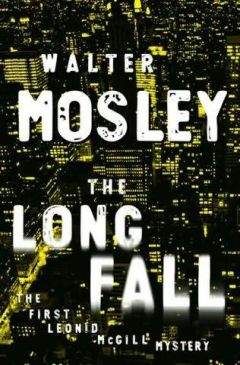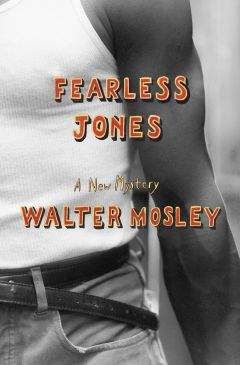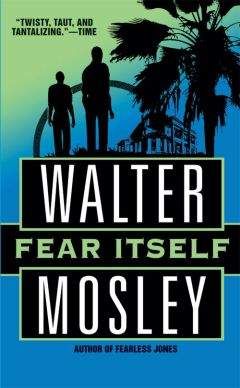Walter Mosley - The Long Fall
На электронном книжном портале my-library.info можно читать бесплатно книги онлайн без регистрации, в том числе Walter Mosley - The Long Fall. Жанр: Прочее издательство неизвестно, год 2004. В онлайн доступе вы получите полную версию книги с кратким содержанием для ознакомления, сможете читать аннотацию к книге (предисловие), увидеть рецензии тех, кто произведение уже прочитал и их экспертное мнение о прочитанном.
Кроме того, в библиотеке онлайн my-library.info вы найдете много новинок, которые заслуживают вашего внимания.

Walter Mosley - The Long Fall краткое содержание
The Long Fall читать онлайн бесплатно
“LT?”
“Hush.”
“What do you need?”
“Some assistance.”
“When and where?”
THERE WAS NO going to sleep for hours after that dream.
I went to the dining room and reflected on the wilderness of my mind.
I had always been the runt since as far back as I can remember. After the age of twelve I was fatherless and poor for real—not for the Movement. My mother died when I had just turned fourteen. She just gave up. I never blamed her, though. I was alone in the world and rarely took a backward step in the ring of life. I was what Gordo called a banger. I moved forward, took my lumps, and gave just as good. If a bigger kid picked on me he better know how many teeth he could afford to lose. Anã€rd to lod if the principal or some foster parent thought that I was there to take orders—they learned.
I can count on one hand the number of people who have ever truly frightened me. Hush is at the top of that list.
As far as I know I’m one of only three people who know his real name, and I would never say it out loud, much less write it down.
For nearly two decades he was the man the professionals went to when they wanted somebody dead. He would kill anyone, anywhere. If you needed it to look like an accident, there was a heart attack or a car accident in the offing. If the body needed to disappear, it would never be found. He was so good that even the head men of foreign mobs thought twice before uttering his code name—and no one ever refused to pay.
Few people had ever seen him for who and what he was. When he showed up as a delivery boy or trash collector, all and sundry were unimpressed. He was a pale white guy, five-ten with close-cut brown hair. He was powerful but not particularly well built. The only thing that marked him was a deep voice that rumbled rather than spoke.
He could kill an armed man with only a mouthful of water.
No one wanted to hear that Hush was after them. He was the walking, breathing personification of pancreatic cancer.
When people found out that Hush was after them, their reactions were many but predictable. Some ran. Others bought life insurance and settled up their affairs. A few went to the police and sought witness protection, but in the end they all died. I know this because I know Hush.
People responded in all kinds of ways when they were tipped to Hush’s intentions, but of them Carter Brown of East New York was unique. When Carter heard that his uptown rival had paid a hundred large for Hush’s services, he laughed. He was the one man who wasn’t afraid of the excellent assassin. He wasn’t afraid because he knew about the hit man’s Achilles’ heel: a young black woman named Tamara and a toddler that was Hush’s child.
It had taken at least twenty-five moving pieces for Hush to get in touch with me. The meet was set for one of those big glass-and-chrome salad bars in midtown Manhattan at 2:15, when the lunch crowd was winnowing down but still pretty busy. He was seated at a table for two by a window looking out on Forty-eighth Street.
I knew he was the killer when I looked into his eyes.
He laid out the whole problem right there in the open, with a hundred masticating clerks and secretaries jabbering around us about their bosses and sex lives and children.
Tamara and the boy, Thackery, had been kidnapped and Brown was demanding the execution of his rival.
It was hard for me to concentrate at first. After all, in my profession, Hush was like royalty.
“ã€ont sizeSo?” he said after explaining his dilemma.
“Why not just kill Big Joe?” I asked, pretending that there was some equality between us.
“I would if I felt that Brown would keep his word. But he knows that I have to kill him for doing what he’s done. He has to get rid of me, and then who would protect my family?”
“Okay,” I said. “I’ll do it.”
“How much?”
“On the house.”
That set the killer three inches back in his seat.
“Why?”
“Professional courtesy,” I said and then I stood up on legs that have had easier times in the ring, sparring with heavyweights.
IT TOOK ONLY five hours for me to locate and liberate Tamara and Thackery. Carter could hide them from white eyes but it was easy for me to see beyond his blind of race. I called a guy I knew, the brother of one of Carter’s ex-girlfriends. He told me of a safe house that Carter kept for “visiting dignitaries” like Colombian drug lords and Russian mobsters, Chinese slavers and Mexican cartel bosses who dealt in protection rackets for a broad spectrum of illegal labor.
I didn’t feel guilty about betraying a brother. He had kidnapped a black woman and her child, after all. And Carter was a very bad man, worse than I ever was, so I didn’t mind taking his living shields away.
Carter disappeared that very evening and Hush took his services off the market. He got a job working for an elite limo service and now chauffeurs around high-profile clients who might need protecting.
Ê€„
44
I crawled back into my son’s bed at dawn and fell into a deep sleep with no fires or hidden assassins dogging my dreams. When I finally awoke it was a little after nine and the house was empty. I walked through the prewar rooms but no one was there. The kids were in summer school and Katrina was at the gym.
I went to work.
In a little cubbyhole that Twill had cut along the baseboard at the back of his closet I found a .22 pistol in a slightly battered cherry-wood box. The gun was unloaded, but there was a box of ammunition next to it. I considered confiscating the piece but thought better of it. Twill was too cunning for that to stop him for long, and, anyway, I had more than a week before he planned to commit his capital crime.
I MET HUSH in the gentrified meatpacking district just south of Fourteenth Street at 10:45. He usually drove the company Rolls but that day he was behind the wheel of a standard black Lincoln sedan. No need to call attenti怅on to ourselves when there might be mischief afoot.
I climbed in the backseat and he glanced up in the rearview mirror and into my eyes. I don’t know what he was looking for but he seemed satisfied.
“What’s the plan?” he asked.
“Moore says that the blackmailer wants him to bring the money to room C on the third floor at ten tonight. I want to bug the place and see what there is to be seen before that time.”
The killer gave a short nod and turned the key in the ignition.
“I’m just the insurance,” he said as we pulled away from the curb.
I saw no reason to corroborate a fact and so remained silent.
THE CONDEMNED APARTMENT house was a couple of buildings east of the West Side Highway, on the north side of the street. We parked at the far end of the block. I was told that there was a key behind a loose brick just above the mailbox, but Hush and I went around the back and broke in through the cellar door.
He was armed and so was I. The guns were in our hands. I used a penlight to guide us. The door to the studio apartment was open. A few errant beams of sunlight shot through the cracks in a boarded-up window. We glided in, scanned the room, and then I nailed a small block of wood on the sill of a window that looked out into darkness.
“Good place to kill somebody,” Hush commented.
Those words sent a chill through my shoulders.
The dented and dirty block of unpainted wood had a transmitter embedded in it with a tiny fiber-optic lens peeking out like the tip of a nail. It was the kind of little addition that you’d never notice unless you were in the room every day.
WE MADE IT back to Hush’s car and turned on the laptop that received the transmissions from Tiny’s very special bug. The image of the dark room appeared and all we had to do was wait. If any motion was detected, a red light would start flickering at the bottom of the screen.
I sat in the backseat with the computer beside me. Hush stayed up front, as silent as dust.
There were little red flashes now and then, triggered by passing rats, but that was all.
At a little after one I started getting bored.
“How’s it going, Hush?” I asked to cut the monotony.
He only turned his profile to me, but I could see the mild astonishment on his face. Nobody who knew Hush made small talk with him. After a moment he turned far enough to face me. At firsë€ce me. At his brows were knitted, but then he gave me a weak smile.
“I joined a monastery,” he said.
While I was trying to figure out if this was an attempt at humor, he added, “I remembered when you told me about that meditation stuff and connected with a bunch of Zen Buddhists off the Grand Concourse in the Bronx. Black guys mostly.”
Hush had once commented on my cool demeanor in rough situations. I told him about Zazen sitting.
“Does it help?” I didn’t feel afraid but my pulse had quickened.
“Keeps me straight,” he said. “Keeps me focused. They teach you how to sit for hours with your mind in another place. It takes some of the edge off.”
I could only imagine what edge he was talking about.
Five minutes must have passed. He was still sitting with his back to the driver’s-side door.
“I got my girl and son down on an island off the Carolina coast,” he said, continuing our conversation. “Everything you need to know about them is in an envelope that I gave that lawyer of yours—that Breland Lewis. Don’t worry, though, he won’t know you know me until he opens the letter.”
I hadn’t given him Breland’s name, never told him that I had a lawyer.
“I want you to look in on them from time to time if I’m incapacitated or dead,” he added. “You’ll have access to the funds they’ll need. Tamara has to cosign, of course.”
“Of course,” I said, just to make it a conversation.
I suppose that was Hush’s way of saying that he considered me a friend. It felt like having a king cobra slither up on the barstool next to you: you didn’t necessarily like the company, but then again, you had second thoughts about any sudden motions, much less getting up and walking away.
At 2:18 my cell phone made the sound of yipping hyenas.
“Hello?”
“Sanderson’s awake,” Carson Kitteridge said in my ear.
HUSH TOOK THE laptop in the front seat and I walked over to Tenth Avenue, where I hailed a cab.
The hospital they had Sanderson in was up in the Sixties on the East Side.
The man who should have been dead was on the fifth floor, with two strapping police guards on the door.
As I approached they got to their feet, forming a very effective blockade. I might have been nervous if I hadn’t alreë€ I hadn’ady fought and won against the monster that they were guarding.
“Off limits,” the cop closest to me said. He had copper hair and skin so white it seemed to be turning green.
He put a hand on my shoulder.
“Get yer fuckin’ hand off me, son,” I said. Don’t ask me why. Maybe it was all the tension from being in such close quarters with a commercial serial killer for the better part of four hours.
“What?” the bright penny said in warning.
“It’s okay, Landis,” Carson Kitteridge said. He was coming out from the hospital room. “LT here has a thin skin. Breathe on him hard and he feels it.”
Landis was six feet tall, so he had to look down to peer into my eyes. He didn’t like me. Maybe I should have given him a number and asked him to stand on line.
“Shall we?” Kitteridge said, indicating the room behind with a twist of his head.
“I wanna talk to him alone,” I said.
This time he shook his head.
“Nice talkin’ to you, then.” When I moved my shoulder in preparation to leave, Landis spoke again.
“Stay right where you are.”
“Say what?”
“You heard me.”
“Tell me something, boy,” I said slowly and clearly. “Didn’t your mother ever tell you that children should be seen and not heard?”
The green undershade of the cop’s complexion was turning pink.
“Stand down, Landis,” Carson said. And then to me, “Okay, LT. But I wanna know what you get.”
THERE WERE LIFE-SUPPORT machines in the private hospital room but they weren’t hooked up or turned on. Sanderson had two IVs dripping medicine and sustenance into his veins and two strawlike oxygen tubes that he’d pulled away from his nose. He was sitting up against a few pillows, staring at me. His left hand was shackled to the metal bed frame. I remember wondering if that short span of chain was enough to hold the monster.
The gash on his forehead was already closing up. It was the first time that I got a good look at what I like to call the face of the man’s personality.
It was the bloated visage of a petulant boy but I wasn’t fooled; I had felt that boy’s strength and murderous intent.
Rather than slaughter, there was now ë€there wawariness in Willie’s eyes. He was looking for the thirty-odd-pound chair upside his head. I could see that, just in our fight, I had only one chance with him.
“They got you on the Roger Brown killing,” I said before sitting in the chair next to his mechanical bed. I noted that Kitteridge had placed the seat out of the killer’s reach. “They also know about Norman Fell.”
Only the quick darting of his eyes told me that he was surprised at the mention of the Albany detective.
“I went up to see Bunny at the sanitarium,” I added.
“He put her back in there?” he said.
I must have reacted in some way, shown an eagerness or something, because he clamped down after uttering those few words and nothing I could do would open him up again.
Похожие книги на "The Long Fall", Walter Mosley
Walter Mosley читать все книги автора по порядку
Walter Mosley - все книги автора в одном месте читать по порядку полные версии на сайте онлайн библиотеки My-Library.Info.



